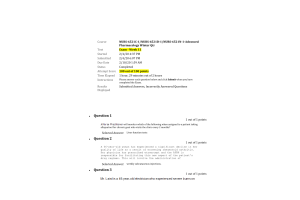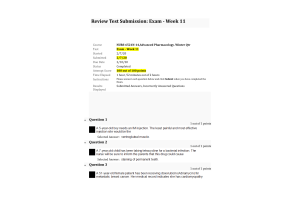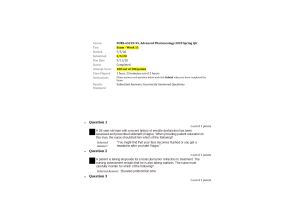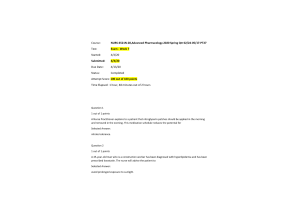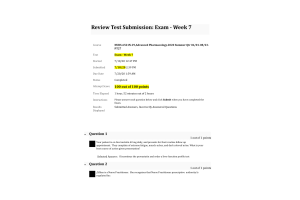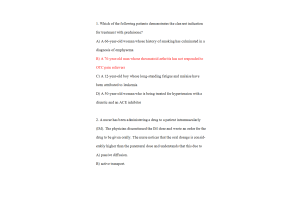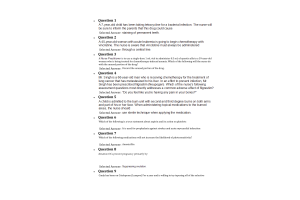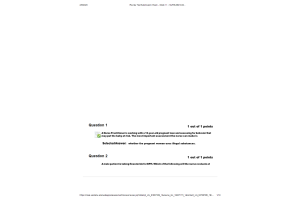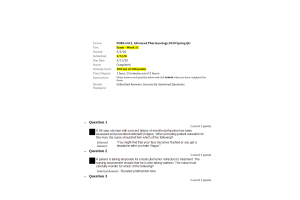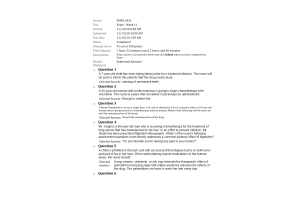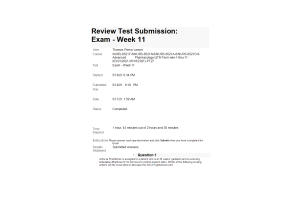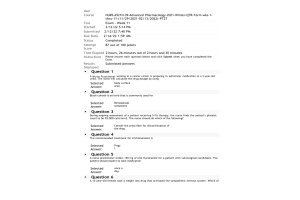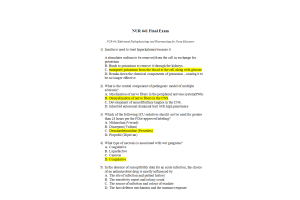NURS 6521D-6, NURS-6521F-6, NURS-6521N-6-Advanced Pharmacology; Exam - Week 7 Midterm (100 out of 100 points)
- $39.00
- Question: A patient has been prescribed an oral drug that is known to have a high first-pass effect. Which of the following measures has the potential to increase the amount of the free drug that is available to body cells?
- Question: A nurse works in a private hospital and needs to administer some narcotic drugs to one of her patients. Which of the following should the nurse consider when administering narcotics to patients in a hospital setting?
- Question: A nurse is caring for a patient who abuses marijuana. The treatment for marijuana abuse consists mainly of
- Question: A nurse is caring for a patient who is in severe pain and is receiving an opioid analgesic. Which of the following would be the nurse's priority assessments?
- Question: A patient has been receiving regular doses of an agonist for 2 weeks. Which of the following should the nurse anticipate?
- Question: A nurse is creating a plan of care for a 68-year-old woman with a recent diagnosis of unstable angina and new prescription for nitroglycerin. Which of the following nursing diagnoses should the nurse prioritize in the planning of this patient's care?
- Question: A nurse is providing a patient with a list of drugs as a part of the patient's plan of care. Which of the following drug nomenclatures should the nurse use to list the drugs?
- Question: Federal legislation dictates a lengthy and rigorous process of testing for new drugs. What is the primary purpose of this testing process?
- Question: During a clinic visit, a patient complains of having frequent muscle cramps in her legs. The nurse's assessment reveals that the patient has been taking over-the-counter laxatives for the past 7 years. The nurse informed the patient that prolonged use of laxatives
- Question: A home health nurse notes that there have been changes to a patient's oral drug regimen. The nurse will closely monitor the new drug regimen to
- Question: What critical piece of information is missing from the following medication order: Amoxicillin 250 mg every 8 hours?
- Question: A patient has recently been prescribed a drug that treats his hypertension by blocking the sympathetic receptors in his sympathetic nervous system. This action is characteristic of
- Question: Which of the following will a nurse inform the patient is one of the most common adverse effects of guaifenesin (Robitussin)?
- Question: A patient who has ongoing pain issues has been prescribed meperidine (Demerol) IM. How should the nurse best administer this medication?
- Question: A nurse is providing patient education to a 35-year-old man who has been prescribed clonidine (Catapres) as part of step 2 antihypertensive therapy. The nurse should anticipate that the drug will be administered
- Question: A 49-year-old woman has been diagnosed with myalgia. The physician has recommended aspirin. The patient is concerned that the aspirin will upset her stomach. The nurse will encourage the patient to
- Question: A nurse notes new drug orders for a patient who is already getting several medications. Which of the following is the most important consideration when preparing to administer the new drugs?
- Question: A nurse is discussing with a patient the efficacy of a drug that his physician has suggested, and he begin taking. Efficacy of a drug means which of the following?
- Question: The nurse's assessment of a community-dwelling adult suggests that the client may have drug allergies that have not been previously documented. What statement by the client would confirm this?
- Question: An 80-year-old patient has been taking lorazepam since his wife died a year ago. He has been staying with his son, but will now move to an assisted living facility. Before admission to the assisted living facility, the patient's physician has determined that the drug is no longer needed. The nurse at the facility will plan to
- Question: A patient has been prescribed lithium therapy. Which of the following signs and symptoms will the nurse tell the patient to report immediately?
- Question: The lower respiratory system utilizes a number of different mechanisms that confer protection and maintain homeostasis. Which of the following physiological processes protects the lower respiratory system?
- Question: female patient, age 36, is prescribed inhaled corticosteroid (ICS) for daily use. Which of the following adverse effects should the nurse closely monitor for in this patient?
- Question: A nurse practitioner understands when prescribing a medication that there are certain questions to address. Check all that apply.
- Question: A teenage boy has undergone a diagnostic workup following several months of persistent, bloody diarrhea that appears to lack an infectious etiology. The boy has also experienced intermittent abdominal pain and has lost almost 15 pounds this year. Which of the following medications is most likely to treat this boy's diagnosis?
- Question: A nurse working for a drug company is involved in phase III drug evaluation studies. Which of the following might the nurse be responsible for during this stage of drug development?
- Question: A 65-year-old woman has an advanced form of rheumatoid arthritis. Her treatment includes a regular dosage of methotrexate. The nurse will advise her to take which of the following vitamin supplements while taking the drug?
- Question: An unconscious patient has been brought to the hospital, and the physician has prescribed a life-saving drug to be administered parenterally. Which of the following methods would be the most appropriate for the nurse to use when administering the medication?
- Question: A male patient is to begin glyburide (Diabeta) for type 2 diabetes. Before the drug therapy begins, a priority action by the nurse will be to assess the patient's
- Question: To minimize the risk of adverse effects of glucagon when given to an unconscious diabetic patient, as the patient regains consciousness, the nurse should
- Question: A nurse is caring for a 61-year-old man who has had a severe attack of gout while in the hospital for food poisoning. The nurse administers colchicine intravenously in order to
- Question: A patient who is experiencing withdrawal from heavy alcohol use have developed psychosis and been treated with haloperidol. Which of the following assessment findings should prompt the care team to assess the patient for neuroleptic malignant syndrome?
- Question: A patient who has been admitted to the hospital for a mastectomy has stated that she has experienced adverse drug effects at various times during her life. Which of the following strategies should the nurse prioritize in order to minimize the potential of adverse drug effects during the patient's stay in the hospital?
- Question: A patient receives 25 units of NPH insulin at 7.AM. At what time of day should the nurse advise the patient to be most alert for a potential hypoglycemic reaction?
- Question: A nurse is teaching a patient about his newly prescribed drug, colchicine, for gout. The nurse will instruct the patient to avoid which of the following foods?
- Question: A nurse is caring for a 46-year-old patient of Chinese origin who has bipolar disorder. The physician has prescribed lithium carbonate (Eskalith) to treat the disorder. The nurse is aware that the lithium dose will likely be given in a
- Question: A patient is being treated for respiratory infection. He is a recovering alcoholic and has impaired liver function. The nurse will instruct the patient to be especially cautious when taking
- Question: A 25-year-old woman comes to the clinic because of a chronic, nonproductive cough. Assessment reveals that she has a history of asthma and dextromethorphan, (Robitussin) is prescribed for her. The nurse will question this order because
- Question: A high school student was diagnosed with asthma when he was in elementary school and has become accustomed to carrying and using his "puffers". In recent months, he has become more involved in sports and has developed a habit of administering albuterol up to 10 times daily. The nurse should teach the student that overuse of albuterol can lead to
- Question: These drugs have a potential for abuse, but the potential is lower than for drugs on Schedule 2. These drugs contain a combination of controlled and noncontrolled substances. Use of these drugs can cause a moderate to low physiologic dependence and a higher psychological dependence. A verbal order can be given to the pharmacy and the prescription can be refilled up to five times within 6 months. Examples include certain narcotics (codeine) and nonbarbiturate sedatives. This is scheduled drug
- Question: A nurse who is responsible for administering medications should understand that the goals of the MedWatch program are to (Select all that apply.)
- Question: A 40-year-old woman with a diagnosis of fibromyalgia has been prescribed cyclobenzaprine (Flexeril) as an adjunct to her existing drug regimen. What nursing diagnosis should the nurse prioritize when updating the nursing care plan for this patient?
- Question: A 52-year-old man is suffering from a deficiency of exocrine pancreatic secretions and is prescribed pancrelipase (Pancrease MT). Before the medication therapy begins, the nurse will assess for allergies related to
- Question: A nurse is caring for a patient with chronic angina. The patient is receiving ranolazine (Ranexa) 500 mg PO bid. Which of the following signs or symptoms would the nurse attribute to being a common adverse effect of this medication?
- Question: A nurse is caring for an 81-year-old patient in a long-term care facility who takes nine different medications each day. The patient has a recent diagnosis of seizure disorder and has begun treatment with phenytoin (Dilantin), a highly protein-bound drug. After 1 month of Dilantin therapy, the patient is still extremely drowsy and sluggish. The nurse determines that the prolonged adverse effect is likely due to
- Question: An elderly postsurgical patient has developed postoperative pneumonia in the days following abdominal surgery and is being treated with a number of medications. Which of the following medications that the nurse will administer has the slowest absorption?
- Question: A patient has a blood serum drug level of 50 unitsmL. The drug's half-life is 1 hour. If concentrations above 25 unitsmL are toxic and no more of the drug is given, how long will it take for the blood level to reach the nontoxic range?
- Question: A patient is in the clinic for seasonal allergic rhinitis. Loratadine (Claritin) is prescribed. Which of the following statements will the nurse include when providing patient education concerning this drug?
- Question: Talwin given in combination with Vistaril diminishes the adverse effects of nausea caused by the Talwin. This drug interaction affecting the pharmacodynamics of the Talwin is
- Question: In order to promote therapeutic drug effects, the nurse should always encourage patients to
- Question: A 57-year-old male patient who has been prescribed doxorubicin for small-cell lung cancer is advised by the nurse to avoid taking aspirin or drugs that contain aspirin because it may
- Question: A 70-year-old woman is starting on an acidic drug. The nurse is aware that food and nutrient intake can affect drug excretion by changing the urinary pH. About which of the following will the nurse question the patient concerning her diet?
- Question: A patient who has been taking buspirone (BuSpar) for 1 week calls the clinic and reports to the nurse that the drug is not working. The patient informs the nurse that she is still having symptoms of anxiety. The nurse will tell the patient that
- Question: A 33-year-old man has developed acute gouty arthritis. He has been prescribed colchicine. When developing a care plan for this patient, which factor will be most important for the nurse to consider?
- Question: A 42-year-old man is being treated for a peptic ulcer with ranitidine (Zantac) taken PO at bedtime. Even though few adverse effects are associated with this drug, one common adverse effect that can be severe is
- Question: A nurse is overseeing the care of a young man whose ulcerative colitis is being treated with oral prednisone. Which of the following actions should the nurse take in order to minimize the potential for adverse drug effects and risks associated with prednisone treatment?
- Question: A patient has been admitted to the ICU because of multiple traumas due to a motor vehicle accident. The physician has ordered propofol (Diprivan) to be used for maintenance of sedation. Before administration of propofol, a priority assessment by the nurse would be to check for a history of
- Question: A male patient has been brought to the emergency department during an episode of status epilepticus. Diazepam is to be administered intravenously. The nurse will be sure to
- Question: A 75-year-old woman is prescribed magnesium hydroxide for constipation. The nurse's assessment reveals that the patient is being treated for rheumatoid arthritis and hypertension. The patient lives in assisted living and is on a low-sodium diet. Before the magnesium hydroxide therapy begins, it will be most important for the nurse to assess the patient's
- Question: A female patient with a diagnosis of type 1 diabetes mellitus has been experiencing increasing neuropathic pain in recent months, a symptom that has not responded appreciably to conventional analgesics. The patient's care provider has begun treatment with gabapentin (Neurontin). How is the addition of this drug likely to influence the management of the patient's existing drug regimen?
- Question: A nurse is caring for a postsurgical patient who has small tortuous veins and had a difficult IV insertion. The patient is now receiving IV medications on a regular basis. What is the best nursing intervention to minimize the adverse effects of this drug therapy?
- Question: A patient with a diagnosis of non-small cell lung cancer is currently undergoing chemotherapy. At the encouragement of a family member, the patient has announced to the nurse his intention to complement this treatment with a regimen of herbal remedies. How should the nurse respond to this patient's statement?
- Question: A resident of a long-term care facility receives 12.5 mg metoprolol (Lopressor) at 8 AM and 8 PM daily. Before administering this drug, the nurse should perform and document what assessments?
- Question: A 53-year-old man has been treated for severe asthma for several years with prednisone. Recently, his physician initiated alternate-day therapy for him. The patient tells the nurse that he would rather take the medication every day to prevent confusion. Which of the following would be the best response by the nurse?
- Question: A nurse is teaching an older adult patient about polypharmacy. Which of the following statements best describe this term?
- Question: A nurse is caring for a 73-year-old man who is receiving drug therapy. He is beginning to exhibit signs of decline in his renal system, yet his current serum creatinine level is normal. The nurse will base the patient's plan of care on the understanding that there is
- Question: A nurse is assigned to a patient who is taking lithium. Which of the following drug serum levels would indicate that the patient is at risk for adverse effects of the drug?
- Question: A 58-year-old man is admitted to the emergency department. A diagnosis of severe digoxin toxicity is made. Bradycardia is present, and an electrocardiogram (ECG) confirms toxicity. The nurse will administer which of the following drugs?
- Question: A nurse works in a sleep disorder clinic and is responsible for administering medications to the patients. Which of the following patients would be most likely to receive zaleplon (Sonata)?
- Question: A 79-year-old patient in a long-term care facility is to receive an intravenous fat emulsion. Which of the following lab values would be a priority for the nurse to assess before administration?
- Question: A nurse is caring for a patient who has been diagnosed with hypothyroidism. Levothyroxine (Synthroid) has been prescribed. Before the drug therapy is started, the nurse will assess for which of the following?
- Question: An 80-year-old man has been prescribed oxycodone for severe, noncancer, chronic pain. He tells the nurse that he has difficulty swallowing and asks if he can crush the tablet before swallowing. The nurse will advise the patient that
- Question: A nurse is providing discharge instructions to a patient who will be taking fludrocortisone at home. The nurse will encourage the patient to eat a diet that is
- Question: A patient will begin three new medications as part of her treatment plan. The nurse practitioner understands that proper disposal of medications is key when the nurse practitioner states
- Question: A diabetic patient being treated for obesity tells the nurse that he is having adverse effects from his drug therapy. The patient has been taking dextroamphetamine for 2 weeks as adjunct therapy. Which of the following adverse effects would need the nurse's immediate attention?
- Question: A 70-year-old patient has just started taking lorazepam 10 days ago for anxiety issues related the death of her husband. She is staying with her daughter for a couple of weeks. The patient's daughter has noticed that her mother is having difficulty walking and seems to be confused at times and calls the clinic to report this to the nurse. The nurse will inform the daughter that
- Question: A 72-year-old man with pain issues is being given a drug by the intramuscular route. His serum blood level concentrations have been erratic. The nurse suspects that this may be due to
- Question: A 13-year-old patient has juvenile arthritis. He has recently had oral surgery and was told by the surgeon to take aspirin for the pain. The nurse will monitor for which of the following?
- Question: A community health nurse is performing a home visit to an elderly client who receives twice-weekly wound care. The client has mentioned that she has been having difficulty sleeping, a problem that she has not previously experienced. Which of the following measures should the nurse suggest?
- Question: A male patient is to begin treatment for pneumonia with an albuterol (Ventolin) inhaler. The nurse will advise the patient that he will most likely experience which of the following common adverse effects of the drug?
- Question: A patient has GERD and is taking ranitidine (Zantac). She continues to have gastric discomfort and asks whether she can take an antacid. Which of the following is an appropriate response by the nurse?
- Question: Mesalamine (Asacol) is prescribed for a 22-year-old woman with Crohn disease. The nurse will discuss with the patient the possibility for which of the following adverse effects related to the new drug therapy?
- Question: A 79-year-old woman who takes several medications for a variety of chronic health problems has been prescribed an oral antiplatelet aggregator that is to be taken once daily. The nurse has encouraged the woman to take the pill at the same time of day that she takes some of her other medications. What is the most likely rationale for the nurse's advice?
- Question: A homeless man who is well known to care providers at the local hospital has been admitted to the emergency department after having a seizure outside a mall. The man is known to be a heavy alcohol user and is malnourished with a very low body mass index. How are this patient's characteristics likely to influence possible treatment with phenytoin?
- Question: A nurse who provides care for older adults is aware of the high incidence of drug interactions in this population. When educating a group of seniors about the prevention of drug interactions, the nurse should encourage them to
- Question: A 70-year-old man who enjoys good health began taking low-dose aspirin several months ago based on recommendations that he read in a magazine article. During the man's most recent visit to his care provider, routine blood work was ordered and the results indicated an unprecedented rise in the man's serum creatinine and blood urea nitrogen (BUN) levels. How should a nurse best interpret these findings?
- Question: A nurse is caring for a 70-year-old patient who is taking desmopressin (DDAVP). The patient has a history of cardiovascular disease. The nurse will prioritize the assessment of which of the following?
- Question: A patient comes to primary clinic for strep throat. A throat swab culture is sent to lab. What information is required for the nurse practitioner to disclose on lab transmittal?
- Question: Mr. Tan is a 69-year-old man who prides himself in maintaining an active lifestyle and a healthy diet that includes adequate fluid intake. However, Mr. Tan states that he has experienced occasional constipation in recent months. What remedy should be the nurse's first suggestion?
- Question: A 33-year-old woman has irritable bowel syndrome (IBS). The physician has prescribed simethicone (Mylicon) for her discomfort. Which of the following will the nurse monitor most closely during the patient's drug therapy?
- Question: An older adult who lives in a long-term care facility has recently begun taking losartan (Cozaar) for the treatment of hypertension. The nurse who provides care for this resident should recognize that this change in the resident's medication regimen make create a risk for
- Question: A 57-year-old man is to begin 5-FU therapy for colon cancer. It will be most important for the nurse to monitor which of the following during the first 72 hours of the initial treatment cycle?
- Question: A patient with diabetes has had a cough for 1 week and has been prescribed a cough syrup (an expectorant). What special instructions should the nurse include in the patient teaching for this situation?
- Question: To maximize the therapeutic effect of diphenoxylate HCl with atropine sulfate, the nurse will instruct the patient to take the medication
- Question: A 22-year-old male college senior has lived with a diagnosis of Crohn's disease for several years and has undergone several courses of treatment with limited benefit. Which of the following targeted therapies has the potential to alleviate the symptoms of Crohn's disease?
- Question: A patient has been prescribed zolpidem (Ambien) for short-term treatment of insomnia. Which of the following will the nurse include in a teaching plan for this patient? (Select all that apply.)
- Question: A patient is suffering from acute inhalant intoxication. The priority nursing intervention will be to
- Question: Following an endoscopy, a 66-year-old man has been diagnosed with a duodenal ulcer resulting from Helicobacter pylori infection. Which of the following medications will likely be used in an attempt to eradicate the patient's H. pylori infection? (Select all that apply.)
- Question: On the 1 a.m. rounds, the nurse finds a patient awake and frustrated that she cannot go to sleep. The nurse administers an ordered hypnotic to help the patient sleep. Two hours later, the nurse finds the patient out of bed, full of energy and cleaning her room. The nurse evaluates the patient's response to the hypnotic as
- Question: Drugs have a valid medical use but a high potential for abuse, both psychological and physiologic. In an emergency, a Schedule 2 drug may be prescribed by telephone if a written prescription cannot be provided at the time.
- Question: However, a written prescription must be provided within 72 hours with the words authorization for emergency dispensing written on the prescription. These prescriptions cannot be refilled. A new prescription must be written each time. Examples include certain amphetamines and barbiturates. This is scheduled drug

